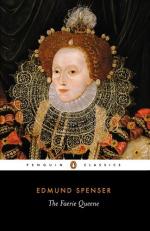1593 Shakespeare’s Midsummer
Night’s Dream.
1593 Richard III.
Second marriage, 1594 Shakespeare’s Richard II.
Colin Clout’s Come Home Again, 1595 Shakespeare’s King John.
Amoretti, Epithalamion, Hymns 1595 Johnston’s Seven Champions
of Christendom.
Astrophel, Prothalamion, 1596 Shakespeare’s Merchant of Venice.
The Faerie Queene, Books I-VI 1596 Ben Jonson’s Every Man in his
Humour.
Vision of the Present State of 1598 Edict of Nantes,
Ireland Philip III crowned.
Death of Spenser, 1599 Revolt of Irish. Expedition
of Essex to Ireland.
* * * * *
THE FAERIE QUEENE
* * * * *
LETTER TO SIR WALTER RALEIGH
A LETTER of the Authors expounding his whole intention in the course of this worke;[1] which, for that it giveth great light to the reader, for the better understanding is hereunto annexed.
TO THE RIGHT NOBLE AND VALOROUS
SIR WALTER RALEIGH, KNIGHT.
Lo: Wardein of the Stanneries, and her majesties lieutenaunt of the countie of Cornewayll.
SIR,
Knowing how doubtfully all Allegories may be constructed, and this booke of mine, which I have entituled The Faery Queene, being a continued Allegorie, or darke conceit, I have thought good, as well for avoyding of jealous opinions and misconstructions, as also for your better light in reading thereof, (being so, by you commanded) to discover unto you the generall intention and meaning, which in the whole course thereof I have fashioned, without expressing of any particular purposes, or by-accidents therein occasioned. The generall end therefore of all the booke, is to fashion a gentleman or noble person in vertuous and gentle discipline. Which for that I conceived shoulde be most plausible and pleasing, beeing coloured with an historicall fiction, the which the most part of men delight to read, rather for varietie of matter than for profit of the ensample: I chose the historie of king Arthure, as most fit for the excellencie of his person, beeing made famous by many mens former workes, and also furthest from the danger of envie, and suspicion of present time. In which I have followed all the antique poets historicall: first Homer, who in the persons of Agamemnon and Ulysses hath ensampled a good governour and a vertuous man,




